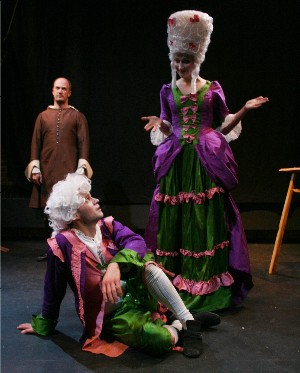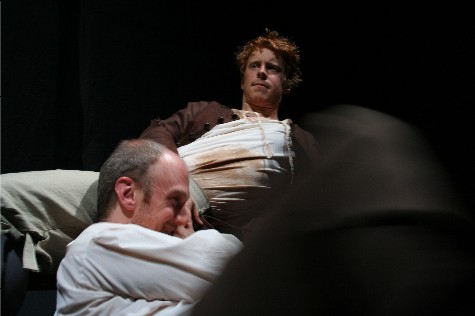Theater Review: A Painfully Good “Europeans”
Director Meg Taintor’s fine staging of Howard Barker’s play focuses on the complex script’s affecting personal through line: the growing love between reluctant war hero and disgraced victim, and their struggle to fashion something real amid the growing artificiality around them.
The Europeans by Howard Barker. Directed by Meg Taintor. Staged by Whistler in the Dark Theatre at The Factory Theater, Boston, MA, through February 26.
By Bill Marx
On the stage, British playwright Howard Barker is deep into the tragicomic possibilities of pain—hurt as fetish, healing, power politics, and the inspiration for speech, love, and hate. His decades of anger as a dramatist (only Edward Bond among living dramatists has sustained fury longer) stems from his embrace of tragedy, his belief that society too quickly mitigates, forgets, or airbrushes away the unforgivable pain it does to itself and others. In a sense, his dense dramas are thorny cries against ideological efforts to assuage and comfort: if we embrace horror in all its forms closely enough and long enough, there’s the fragile opportunity of rebirth.
For his engaging if talky, 1987 historical fantasia The Europeans, Barker picks a doozy of a global trauma: it is set in Vienna in 1683, just after Polish troops have driven the invading Turks/Moslems from the walls of the city. The dramatist could have made more of the theological/cultural clash, but there are some relevant perceptions of arrogance on both sides of the religious divide.
Christian civilization has been saved from the barbarians at the gates, but there is enormous suffering in its wake—starvation, dealing with atrocities, a period of chaos in which some, squarely facing the shameless reality of man’s behavior, dream of reinventing a different society. These prophets of transformation include the city’s military savior, Imperial General Starhemberg, and the randy priest Orphuls, whose revamping of Christ takes a distinctly nihilistic turn. Also wanting to keep agony alive is Katrin, a young woman raped and brutally mutilated by the Turks—she is determined to give birth to her child in as public a way as possible, to market her misery.
But the royal Hapburgs, who fled the city in panic during the war, are back with the goal of reestablishing manners and commerce in peacetime, of clamping down on anything that smacks of the authentic and the resolutely alternative. Europe has narrowly escaped colonization; Barker explores how the history is re-written and manipulated in order to reassert a conservative identity that is based on an inability to love rather than an acknowledgment of shame.
Barker (over) crowds his play with murky characters spouting long speeches (be prepared for challenging lectures and puzzling digressions) detailing the death rattle of a new world: the lineup includes the cartoonized Hapburgs hunting for sadistic laughs in the face of desperation; the marginalized mothers of Orphuls and Starhemberg; Katrin’s sister, hungering for bad boy Orphuls; and an amusing gathering of dim-witted critics arguing about whether art should have anything to do with reality. Amid the extremity Barker comes up with moments of humor; for example, some grisly fun with a severed head.
Even better, director Meg Taintor’s fine staging (pulled off with a minimum of props and period costumes on the tiny Factory Theatre stage) focuses on the affecting personal through line of this play: the growing love between Starhemberg and Katrin, reluctant war hero and disgraced victim, and their struggle to fashion something real amid the growing artificiality around them.
As Starhemberg, Curt Klump conveys the volatile character’s strength and uncertainty—he is experimenting with anti-establishment postures until he sees that caring for Katrin is the most effective means to make his rebellion humane, to maintain healthy pain in his life. Particularly in her later scenes, Jen O’Connor manages to evoke Katrin’s lacerating emotional states. At times, the actress is pretty well defeated by a character who becomes a wooden sounding board for Barker’s daft rhetoric. (Would any mother, while giving birth, scream “I bring you hope. I bring you history.”)
The rest of the Whistler in the Dark cast is agile enough, especially Nate Grundy and Dakota Shepard’s giggly Hapburgs, though the cast members are not always able to carry off with equal aplomb the number of roles they are called to play. Barker’s figures are shameless self-performers—they call for rigor and self-satisfied panache on stage, turning from farce to ferocity on a dime.
But this thoughtful production provides more proof that Taintor and her talented company has a keen eye and ear for the poetry and passion of this difficult but fascinating playwright. And, coming from the old painmeister, The Europeans provides a surprisingly redemptive vision. “I want an art which will recall pain,” pleads Starhemberg, “The art that will be all flourishes and celebration. I want an art that will plummet through the floor of consciousness and free the unborn self. The art that will be extravagant and dazzling.” Whistler in the Dark provides more than enough razzle and dazzle, as well as huzzahs and hurt, to make this production of The Europeans meet the anti-hero’s demands.


